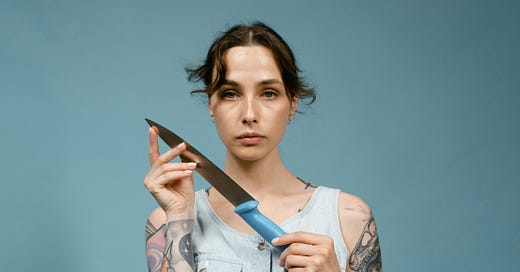Last week I was listening to the radio in the car and I heard a musician from Lesotho mention a proverb: “Woman holds the knife on the sharp side.” I was intrigued, so I told my phone to remind me of it when I got home.1 I didn’t actually know what it meant to someone in Lesotho,2 so I looked it up: women are strong and persevere.
But when I thought of a modern American woman holding a knife on the sharp edge, three words occurred to me: Brave. Foolhardy. Practical.
Brave
Brave is a word that Americans sometimes use for others just living their lives and doing what they have to do. I noticed just today that a transgender contact posted that they’re sick of being told they are “brave” for… being themselves? Refusing to apologize for who they are? Refusing to dress up as someone they’re not? Women have broken through enough glass ceilings that, thankfully, we are no longer “brave” for asking people at work to call us by our names rather than “Mrs. John Smith.” But we are still called “brave” for doing things that men simply do, like choosing a physically difficult profession, creating a startup, or being ambitious.
Brave is a positive word that people use to avoid talking about its negative inverse. Women pioneers in every field are often called brave, when in fact it’s more instructive to look at why she had to be brave and why she was a pioneer. It’s noncontroversial to call a woman who breaks barriers “brave,” but you can’t talk about the patriarchal power structure, calling it out for what it is, without people calling you strident. A woman I know was called “brave” for homeschooling her kid with developmental issues, but she was called strident and worse when she advocated for forcing schools to provide the services they are supposed to provide. So although people tend to use the word brave for women, it’s often misplaced.
Foolhardy
It’s hard to argue that holding a knife on the sharp side is anything but foolhardy… except if she has no choice. We might call someone a fool for attempting something impossible, but more things appear impossible for women, who are presented with roadblocks that men don’t have to face. For example, something I’ve been pondering lately is the incredible physical overhead of being a woman in electoral politics, and the amount of derision that women receive when they fail (ref. the 2016 and 2024 presidential elections). So many of the roadblocks that women face probably don’t even occur to men. I just did an image search of “women in Congress” and the results are what I expected: there isn’t a congresswoman that I scrutinized who appears at work without makeup and styled hair. As a woman whose daily routine has become “scrunch-and-go” for the hair and “yup, I still don’t have visible eyelashes” for my makeup routine, I know the precious amount of time they spend.
Are women “foolish” for doing what they need to do to get ahead in a male-dominated profession? Was the attempt foolhardy if they fail? If men all get knives with nice, sturdy handles and a woman only gets a bare blade, she’s set up to fail. She has to use precious time wrapping that blade in lipstick and a pink pantsuit just to be able to use it. See brave above for what she’s called if she simply gets the job done without cutting her hand. But foolhardy is closer to what people think even when she only fails by the slimmest of margins.
Practical
Personally, holding a knife on the sharp side reminds me that comfortable handles on our tools are a luxury not afforded to everyone. When you’ve got a job to do, you grab the tool at your disposal. For that reason, disadvantaged groups often develop ways of getting by that those in power don’t understand, because power allows you to walk through life using tools with handles. When I was in college I attended a lecture by a Black woman from the very poor town a few miles away who had set up a(n illegal) scheme to get kids with high potential into schools on the other side of the tracks. She used the tools at her disposal—willing white families who offered their home as a family’s school mailing address—to get something that the wealthy families took for granted.3
Women are often given tools with arcane designs, tools not designed for the job at hand, or tools missing vital pieces. The suits that Congressmen wear are standardized, and they are designed to iron out the differences between masculine bodies. But each female politician has to figure out her own costume. Hillary Clinton’s choices were gleefully criticized (remember the whole “scrunchies debate”?); Alexandria Ocasio-Cortez wears her red lipstick like armor; Kirsten Sinema seemed to use her unusual wardrobe as a battering ram.
Women hold the knife on the sharp edge when their choice is between that and no knife at all.
True equality means having access to the same tools
Anyone who argues that “feminism” is out to destroy our culture is missing the basic point: Women don’t actually want to hold the knife on the sharp edge. We need sturdy handles that fit our hands. And that’s all we’re asking for.
Unfortunately, I didn’t catch the musician’s name, though I enjoyed the snippet of his music.
Which is, by the way, not a country nobody has heard of and is pronounced leh-SOO-too.
Eventually, the wealthy school system found out what she was doing, and to their credit, helped her build a legitimate system for helping students with promise get the education they deserved.







Excellent post! Thank you!